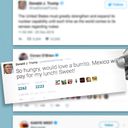2020 misinformation threats extend beyond Russia

Published Date: 9/17/2019
Source: axios.com
Security officials and social media giants are warning that new countries, specifically Iran and China, could pose a misinformation threat to U.S. elections in 2020 similar to Russia's interference in 2016. Why it matters: As President Trump faces off with Iran and China on the international stage, there is growing fear they could try to influence the next U.S. election right under his nose.Beginning in early 2019, social media firms began revealing coordinated campaigns to spread misinformation from countries other than the typical hotbeds in Russia and the Balkans.Iran: In January, Facebook and Twitter separately took down hundreds of accounts and pages linked to misinformation campaigns originating from Iran. Then in May, Facebook said it removed dozens of additional accounts, groups and pages — on its main app and on Instagram — involved in coordinated inauthentic behavior that originated in Iran.According to Facebook, Iranians pretended to be located in the U.S. and Europe, and used fake accounts that impersonated legitimate news organizations in the Middle East. The pages discussed politics in various regions, including the U.S.Facebook was tipped off to the fake accounts by FireEye, a U.S. cybersecurity firm.China: While neither platform has uncovered a misinformation campaign originating from China targeting the U.S., experts say we should be prepared for something along those lines. In August, both Facebook and Twitter said that they uncovered hundreds of accounts originating from inside China that were a part of a coordinated effort to undermine political protests in Hong Kong. China is also blatantly intervening in elections in Taiwan.Chris Johnson, a former top CIA China analyst now at the Center for Strategic and International Studies, says there's no evidence China plans to intervene in the U.S. election on the scale of Russian in 2016, though. He says we're more likely to see "the usual" from China, meaning efforts to influence Chinese-language audiences and the business community without taking drastic measures.That's in part because Chinese leaders want to avoid the type of backlash Russia now faces, but also because they seem "ambivalent" about the prospect of Trump's re-election, Johnson says.Between the lines: There are potentially billions of dollars at stake in 2020 for Iran, which is suffocating under U.S. sanctions and knows Democrats are keen to re-enter or renegotiate the 2015 nuclear deal.Saudi Arabia, Iran's rival, could have precisely the opposite incentive to intervene. It has close ties with Trump's White House but is viewed with hostility by leading Democrats.But China sees the U.S. as "dysfunctional" internationally under Trump, Johnson says, and despite Trump's trade war, leaders in Beijing are unsure whether they'd be better off without him in the White House.What to watch: Still, there's reason to watch China's misinformation efforts closely. Researchers worry Beijing could leverage the growth of TikTok to spread misinformation in the U.S. Go deeper:The misinformation ageWelcome to our new synthetic realitiesMisinformation haunts 2020 primaries